- Home
- Gaelen Foley
Her Secret Fantasy Page 2
Her Secret Fantasy Read online
Page 2
Her mother, for instance, would never have worn the star-shaped pins that twinkled in Mrs. Clearwell’s hair. Especially not to a funeral.
“Oh!” the portly widow exclaimed with sudden vehemence. “Lily, child, you must let me get you away from this gloomy place! I know you are a thoroughgoing homebody, but come to London with me. I insist!”
She offered a wan smile. “I believe I have six months of mourning to fulfill, according to the dictates of propriety.”
“Propriety, my foot!” her godmother protested with flashing eyes. “You’ve been in mourning since you were nine years old! No more, I tell you! Lord Balfour would not have wanted you to be unhappy, nor do I.”
“Ah, you’ve always been so kind to me.”
“That’s because I see great things in you, Lily.”
Lily shook her head at her godmother’s nonsense, wiping a trace of moisture off her cheek and telling herself it was only a raindrop.
“Good, then,” Mrs. Clearwell concluded out of the blue. “It’s all settled. You will come to Town with me and we’ll have a grand time! There are concerts and dinners and balls and soirees—”
“Honestly, I have nothing to wear,” Lily interrupted wearily, a bit scandalized at her godmother’s talk of her going into Society so soon after a death in the family.
“Pish-posh, Miss, life is for the living! As for your clothes, do not trouble your head a bit, we’ll fetch a few dresses for you in a trice. Not a word about expense—I promise you, it is a trifling matter. I am your godmother and I can spoil you if I want! And you know my Norbert died extremely rich.”
Lily gazed at her uncertainly. “It is hard to take your charity.”
“La, girl! Chaperoning a young beauty in London, why, it would be the most excitement I’ve had in years! Now, don’t be proud like your mama, or stiff-necked like His Lordship always was. Come, Lily, I know you are a practical young woman—and you know that I have always been on your side.”
Lily’s eyes filled with tears, but she turned away, making an effort to blink them back. “Very well…I will consider it. Just promise me one thing.” She slid her wily godmother a sideways look.
“What’s that?”
“You wouldn’t be planning on playing matchmaker, would you?”
Mrs. Clearwell beamed. “Well, actually…now that you mention it, dear, there may be two or three agreeable young gentlemen I’ve happened across in London, who I think might just be perfect for you.”
Lily groaned, then reconsidered, and abruptly blurted out a cheeky question: “Are they rich?”
“Lily, darling,” Mrs. Clearwell chided with a merry wink, “rich as princes. Otherwise, I wouldn’t waste your time.”
“Hmm,” she murmured, glancing over her shoulder at the big, cold, and gloomy Balfour Manor. The roof was probably leaking even now.
When Mrs. Clearwell gestured invitingly toward her carriage, Lily looked at her intently, then closed her umbrella and stepped up inside.
By the end of that very trying day, Lily’s mind was settled on the matter. After all their visitors had left, save Mrs. Clearwell, who was upstairs in the guest bedroom at the moment, she called her kinswomen together in the drawing room.
She stood before the fire and faced them with her hands clasped behind her back. “There is something I wish to say to you all together. Something private.”
“Yes, daughter?” Her mother lifted her chin.
Lily squared her shoulders and took a deep breath. “I have decided to accept Mrs. Clearwell’s invitation to London. It’s no use protesting,” she informed them. “We all know something must be done.”
Aunt Daisy frowned and cast an anxious glance at Lady Clarissa, then at Lily again. “But what about your mourning, dear?”
“I think in this case, Grandfather would understand,” she said softly. She hesitated. “As the new owner of this house, I must take action if I am to keep a roof over our heads. So, you see, I shall go to London and find a man of means to be my husband—then none of us shall have to worry long,” she finished hastily over the sound of their gasps.
The three ladies stared at her in shock.
“You’re…going to marry?” her spinster cousin breathed.
“Oh, bless you, Lily, my dear, brave girl!” Aunt Daisy whispered, dabbing her eyes with her handkerchief. “I feared we were headed for the almshouse!”
Lily glanced at her mother to read her reaction. She waited on tenterhooks, searching her face.
Lady Clarissa was silent for a long moment. Then she lowered her embroidery needle and frame. “You are certain you can carry it off?”
Steeling herself to her task, Lily swallowed hard. “I can.”
Her mother’s sapphire eyes narrowed shrewdly. “All of it? A husband will have…certain expectations.”
“Yes. I am aware of that, ma’am. I shall be prepared.”
“But—Mother! Aunt Clarissa! Surely you can’t let her do this!” Cousin Pamela burst out in alarm.
Nobody answered.
“I know we are poor, but you can’t let Lily sell herself like—like an unmentionable female! It’s perfectly macabre!”
“Macabre?” Aunt Daisy echoed, furrowing her brow.
“There must be some other way!” Cousin Pamela insisted. “I know!” She suddenly brightened. “I could sell one of my novels!”
“No!” both of their mothers said in unison.
“My God, you and your Gothic horrors, you will ruin any shred of respectability this family has left,” Lady Clarissa muttered with a dismissive shudder. “I will hear no more of such talk. Ladies don’t write novels.”
“But I could publish it under a pseudonym—”
“We would still know it was you, Pamela,” Lady Clarissa said with great long-suffering. “Honor is honor. Marriage at least is a respectable occupation for a woman. You might have tried it if you hadn’t wasted your youth on all your pointless scribbling,” she added under her breath.
“Yes, ma’am,” Cousin Pamela said faintly. She dropped her gaze, timid and crestfallen once more behind her spectacles.
A flicker of a frown passed over Lily’s face. That was Mother for you. Always correct and straight to the point.
Carelessly cruel.
“You needn’t worry, Pam,” she spoke up, trying to hearten her plain, rather pitiful cousin with a wan smile. “It might seem a little, er, macabre, but I don’t mind it,” she lied, “and besides, our mothers are right. It is merely the way of the world.”
“Well, I, for one, never cared for the world very much.” Regrouping after this slight encouragement, Pamela rose, putting the book she had been studying aside.
Marching over to Lily, Pamela stared into her face, her brown eyes piercing and intense behind her round, rimless glasses. Her breath stank of coffee—she never drank tea. “So, you’re really going to do it, then?” she inquired in a fascinated murmur. “Even after…what happened? You’re going to save us all from destruction by marrying a rich man?”
Lily lifted her chin a notch. “Very rich.”
“Well, then, you’d better pick a stupid one,” Pamela advised. “Easier to fool.”
Lady Clarissa gave an idle laugh. “They’re all rather stupid when you come down to it, dear.”
The dry remark reminded all present that Lady Clarissa had never forgiven her husband for his ill-made scheme of running off to India to save the family fortunes. Not because she had been a particularly devoted wife, but because his death meant that she would never ascend to the title that she had married him for.
If he had lived, she’d have risen to the rank of viscountess. Instead, she was left with the mere courtesy title granted to her on account of her father’s earldom.
“Yes, Lily, you listen to your cousin,” she continued wryly. “Rich and stupid. Exactly the sort of man every girl needs.”
“Right,” Lily forced out softly, masking her dismay. She was determined to emulate her mother’s unsentimental cool
as she faced whatever fate held in store for her in London. She knew full well this was her one chance to redeem herself in her family’s eyes.
Rich and stupid it was.
After all, what smart man would ever want her?
CHAPTER
TWO
London, Two Months Later
He was not what the committee had expected.
The nine Distinguished Gentlemen of the Appropriations Sub-Committee for Eastern Expansion took their seats at the long, elevated table at the front of the moldy medieval chamber and readied themselves for the parliamentary hearing they were about to conduct. Each secretly relished the prospect of an afternoon spent at their favorite game of the old slice-and-dice. Ah, yes, it was ever so pleasant to while away the hours grilling, insulting, browbeating, and badgering whatever unfortunate career officer had been dispatched from the front lines to report back to them, the civilian authorities—answering their questions, providing explanations, in short, scrambling to dance to their tune.
After all, it was they who held the purse strings for the army. Besides, such occasions presented ample opportunity for all the speechifying that no politician could resist.
Having done this many times before, the gentlemen knew what sort of spineless young weasel the commanders in the field always sent: some obsequious fop, no doubt, an aristocratic younger son who would rather have been at the gaming tables at White’s. The sort of unctuous, dandified aide-de-camp who was careful to hang back in the shade of the generals’ tent when the bullets started flying.
But that was not what Colonel Montrose had sent them this time from the front lines of the latest nasty little war in India—the one they largely preferred to forget.
No, indeed.
The chairman nodded to the armed bailiff, signaling their readiness to let the games begin. This worthy, in turn, hauled open the ancient creaking door as if to drag some poor, cowering Christian in to face the lions.
But then, the strong, ringing rhythm of polished boot heels striking the ancient flagstones just outside the door gave the committee their first inkling that their expectations may have been a bit…off.
Then he appeared in the doorway—and half the committee drew back in alarm. A few actually gasped. All of them stared, their gazes traveling over him in awed confusion. They took one look at the bona-fide warrior who had been sent to deal with them and knew that this sun-baked, towering savage was not going away until he got exactly what he came for.
A magnificent specimen in full-dress cavalry uniform, Major Derek Knight stalked into the chamber, and when he passed the long table where the committee members were arrayed, they were forced to note his impressive height, for although their table sat on a raised dais, he was still on eye level with them. He stared forward as he marched in, but was not too humble to look the canny old chairman, Lord Sinclair, straight in the eyes when he passed him.
It was a cool, metallic glance of warning—or a brief, disgusted glare. He ignored the earl’s muttered, “I say!” and prowled on, moving with controlled power and grace, all menace and rippling muscle.
Upon reaching the smaller, lower table set up across from theirs, he stopped, pivoted with crisp precision, and did not salute them but stood at attention, his plumed cavalry helmet under his arm—rather like a Roman centurion, some thought.
For a long moment, none of the Gentlemen knew what to say, quite how to begin. Even the aged chairman was a bit stymied. They could only stare, marveling in spite of themselves to remember that such men existed out on those distant battlefronts.
The major’s indigo coat fitted snugly across his broad chest as he waited. Gold epaulets gleamed on his shoulders. A black silk sash girded his lean waist, the long ends brushing the side of a solid thigh encased in cream-colored breeches. His ebony knee-boots were buffed to a spotless sheen, while his shining silver dress-sword caught the light. His smooth, black hair was bound back in a queue like a horse’s silky tail. His sun-bronzed skin was tough and dark, but the small lines etched around the corners of his pale, wolflike eyes gave him the look of desert nomads used to peering out over long distances of bleak terrain. The proud angle of his chin, his unyielding stony stare, not to mention the startling girth of his biceps all proclaimed the warrior a force to be reckoned with on the battlefield.
Or off it.
“Ahem,” he said, jarring the Gentlemen out of their daze.
The chairman coughed quietly while a few of the others shifted in their seats as they all began to recall with dawning uneasiness that they were accountable to men such as this, being, as they were, in charge of the money the army in India needed to function, and perhaps they had been a tad…remiss.
Watching them with infinite patience, Derek Knight sincerely hoped they felt uncomfortable.
These bloated slugs did not know the meaning of the word. “Uncomfortable” was going into battle knowing that you had so few bullets in your ammunition case that you’d have to load your gun with little rocks after a few shots and pray to God it worked. Or perhaps “uncomfortable” was better described as having the surgeon dig a ball out of your back without at least a swig of whisky to take the edge off the pain. Ah, what is wrong, my dear gentlemen? he thought, hiding his cynical amusement as he watched the subtle signs of a guilty conscience play across each haughty face.
He could almost hear the excuses running through their greedy little minds. To be sure, it was difficult for any man to think of parting with three million pounds sterling, and after all, they were only human. No doubt urgent requests for more funding were easily misplaced, what with all the business such important gentlemen had to conduct each day.
Now and then they received a tally of the casualties, but these were sloughed aside in favor of the mounds of treasure that British generals sent back from India, with new maps staking out the most recently conquered territories.
For all this, Their Lordships were swift to take credit. But in fact, the consistent success of the army in India must have led them to conclude that the task of subjugating the hostile maharajahs must not be all that hard! In which case there was no real rush to send the army the gold and supplies it kept whining for, now, was there?
At bottom, Derek supposed these chaps were all very sure that, come what may, the Indian army would do what it always had done—it would manage, with or without the gold that Parliament had so inconveniently promised.
And so it would. But that was not the point.
Unfortunately for the roomful of politicians that he faced, a promise actually meant something to men like Derek Knight. He had been sent by his crusty old commander, Colonel Montrose, to inform “them demmed cheeseparing bureaucrats” that an army marched on its stomach, not on its feet, and the men would want to be paid.
For his part, Derek was not happy. His boys had been promised this gold and it had not appeared.
Somebody had some explaining to do.
He raised his eyebrows politely. “My Lords. Sirs. Shall I begin?”
“Er, m’boy—right, yes. Please do.”
Apparently they would be skipping the niceties today. What a shame, he thought dryly. It seemed he had shocked the lovely Gentlemen. There was more uneasy throat-clearing as he set his helmet aside and rested his white-gloved fingers atop the files from Horse Guards that he had brought as proof certifying his arguments.
He then proceeded to hand them their arses on a silver platter.
The Gentlemen would have dearly liked to find him an ill speaker. It would have been comforting, no doubt, to reduce the colonial-born barbarian in their minds to the mere killing machine he appeared to be, capable only of following orders. But he quickly dashed their hope when he launched into the explanation he had been preparing for some weeks leading up to this dismal assignment.
With the calm, strategic cunning of a seasoned chess enthusiast, he spent the next half hour explaining the nature of the enemy they faced; the Maratha Empire’s considerable resources for repelling Brit
ish attacks; what was at stake for the realm in all of this, the consequences of failure, and the benefits to be gained by success; and why the whole damned thing mattered, anyway.
“Gentlemen,” he concluded at length, summing it up for those who had glazed over from too many facts. “The Maratha Empire is no trifling foe. It was founded by Hindu royalty of the warrior caste, and is currently ruled by a madman, Baji Rao. Baji Rao is known for his ferocity; he’s killed several of his own family members in order to seize power and keep it. His own people live in fear of him, and now he seeks to unite all the forces he can muster to drive the British out of India. This is what we face. Our colonies are under threat. The army must have the resources we were promised so we can protect our people and our trade.”
He took a long, slow, reproachful look around at them.
“I have been informed that Governor-General Lord Hastings issued his first request for the release of these funds nearly a year ago, but there’s still no sign of the money in Calcutta yet. I implore the committee to understand there is no more time to lose. If we do not give this fight our all, we may lose our foothold in India entirely—and if that happens, our rivals in the region will be happy to take what we cannot hold.”
“Major,” the second-ranked member said complainingly, “Lord Wellington put the Maratha threat down years ago! If they were defeated then, how could they have been permitted to regroup?” The man waited, scowling at Derek as though the whole thing were his fault.
Derek looked at him for a long moment, certain that he had already answered this question several times, but, patient creature—no, saint—that he was, he resisted the urge to walk over and smack the man alongside his balding head to encourage the lot of them to listen.
It worked on the new recruits. Maybe he should try it.
But of course, this was not the Indian frontier. Civilization was ever so annoying. It would have been pleasant to bellow at them in full battlefield throat, but as a matter of principle, Derek did not allow himself to be drawn into arguments with men whose heads he could have crushed with his bare hands under different circumstances.

 My Ruthless Prince
My Ruthless Prince Paladin's Prize
Paladin's Prize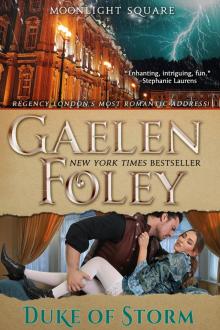 Duke of Storm
Duke of Storm Duke of Scandal (Moonlight Square, Book 1)
Duke of Scandal (Moonlight Square, Book 1) My Irresistible Earl
My Irresistible Earl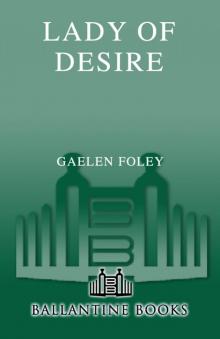 Lady of Desire
Lady of Desire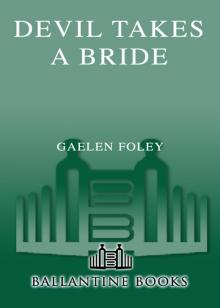 Devil Takes A Bride
Devil Takes A Bride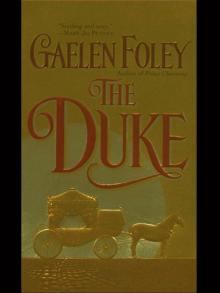 The Duke
The Duke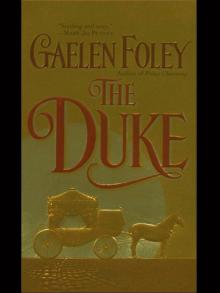 The Duke: The Knight Miscellany Series: Book 1
The Duke: The Knight Miscellany Series: Book 1 Her Secret Fantasy
Her Secret Fantasy Her Only Desire
Her Only Desire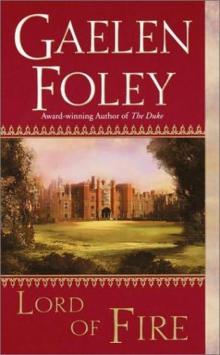 Lord of Fire
Lord of Fire My Wicked Marquess
My Wicked Marquess My Scandalous Viscount
My Scandalous Viscount Duke of Secrets (Moonlight Square, Book 2)
Duke of Secrets (Moonlight Square, Book 2)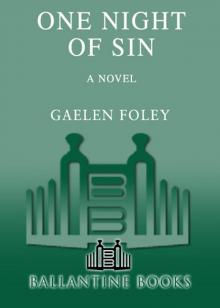 One Night of Sin
One Night of Sin The Secrets of a Scoundrel
The Secrets of a Scoundrel Dream of Me (Harmony Falls, Book 1)
Dream of Me (Harmony Falls, Book 1) His Wicked Kiss
His Wicked Kiss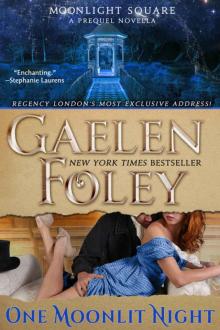 One Moonlit Night (Moonlight Square: A Prequel Novella)
One Moonlit Night (Moonlight Square: A Prequel Novella) My Dangerous Duke
My Dangerous Duke